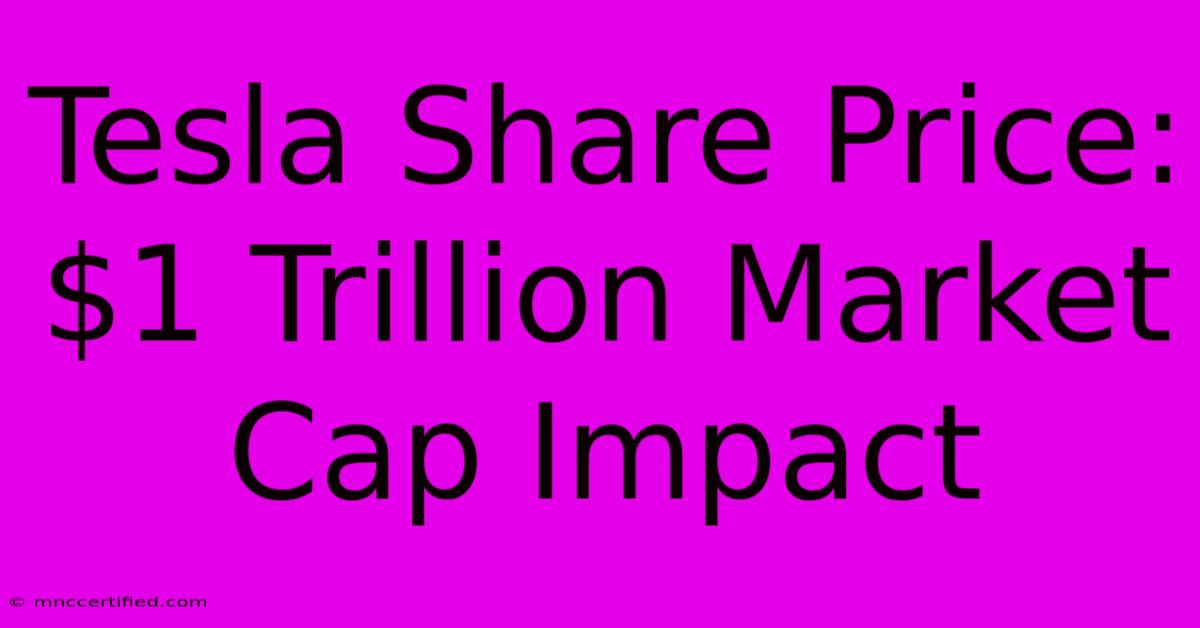Tesla Share Price: $1 Trillion Market Cap Impact

Table of Contents
Tesla's $1 Trillion Market Cap: A Game Changer or Just a Bubble?
In October 2021, Tesla's stock price soared, propelling the electric vehicle (EV) giant to a historic milestone: a $1 trillion market capitalization. This monumental achievement made Tesla the first car company to reach this coveted figure, surpassing even industry giants like Toyota and Volkswagen. But what does this achievement really mean for Tesla, its investors, and the broader automotive industry?
The Rise of Tesla: A Story of Innovation and Disruption
Tesla's journey to the $1 trillion mark is a testament to its disruptive innovation and aggressive growth strategy. Founded in 2003, the company has been at the forefront of the EV revolution, pioneering cutting-edge battery technology and creating sleek, high-performance electric vehicles.
Tesla's commitment to sustainability and its vision for a future powered by clean energy resonated with environmentally conscious investors. The company's strong brand image, coupled with its consistently high growth rates, further fueled its stock price appreciation.
The $1 Trillion Mark: A Symbol of Market Confidence
Reaching a $1 trillion market capitalization is a significant milestone for any company, signifying immense investor confidence in its future prospects. In Tesla's case, it reflects the market's belief in its ability to dominate the burgeoning EV market.
However, the $1 trillion mark also raises questions about the company's valuation. Some argue that Tesla's stock price is inflated, driven by hype and investor enthusiasm rather than fundamentals like earnings and profitability.
Factors Contributing to Tesla's Market Cap Growth:
- Strong Demand for EVs: The global shift towards sustainable transportation has created a booming market for electric vehicles, driving demand for Tesla's products.
- Technological Advancements: Tesla's continuous innovation in battery technology and autonomous driving systems has solidified its position as a leader in the EV sector.
- Elon Musk's Vision: The charismatic CEO's ambitious vision and marketing prowess have helped build Tesla's brand and cultivate a loyal customer base.
- Investor Sentiment: Positive investor sentiment, driven by factors like the company's growth trajectory and perceived technological superiority, has boosted Tesla's stock price.
The Impact of Tesla's Market Cap on the Automotive Industry:
Tesla's achievement has had a profound impact on the global automotive industry. It has spurred traditional car manufacturers to accelerate their own EV development plans, leading to a race for dominance in the electric vehicle space.
The rise of Tesla has also attracted more investors to the EV sector, boosting funding for EV startups and driving innovation in the industry.
Concerns and Criticisms:
- High Valuation: Tesla's stock price has consistently outpaced its financial performance, raising concerns about its valuation and the possibility of a bubble.
- Competition: Tesla faces growing competition from established car manufacturers like Volkswagen, General Motors, and Ford, who are rapidly entering the EV market.
- Production Challenges: Tesla has faced production delays and quality control issues, raising concerns about its ability to meet growing demand.
- Regulatory Risks: The company faces regulatory hurdles and legal challenges related to its autonomous driving technology and safety standards.
The Future of Tesla:
Tesla's future remains uncertain. While its strong brand, innovative products, and growing market share position it well for continued success, the company faces significant challenges.
Factors that could impact Tesla's future include:
- Competition from established car manufacturers
- Continued technological advancements
- Regulatory environment
- Global economic conditions
Whether Tesla can maintain its market dominance and justify its current valuation remains to be seen. The company's future hinges on its ability to execute its growth strategy, overcome challenges, and adapt to the rapidly evolving automotive industry.
Conclusion:
Tesla's $1 trillion market capitalization is a remarkable achievement, but it is not without its risks. The company's future will be shaped by its ability to navigate the challenges of a competitive market, maintain its technological edge, and address concerns about its valuation.
The impact of Tesla's rise on the automotive industry is undeniable. It has spurred a global shift towards electric vehicles and inspired other companies to innovate and develop their own sustainable solutions. The long-term impact of Tesla's market cap on the automotive landscape remains to be seen.
Keywords: Tesla, Market Cap, $1 Trillion, Electric Vehicle, EV, Automotive Industry, Innovation, Competition, Valuation, Stock Price, Elon Musk, Investment, Growth, Sustainability, Future, Challenges, Opportunities.

Thank you for visiting our website wich cover about Tesla Share Price: $1 Trillion Market Cap Impact. We hope the information provided has been useful to you. Feel free to contact us if you have any questions or need further assistance. See you next time and dont miss to bookmark.
Featured Posts
-
Manchester United Van Nistelrooy Ends Interim Stint
Nov 12, 2024
-
Barry Bonds Autographed Rookie Card
Nov 12, 2024
-
Beloved Show Back But Theres A Catch
Nov 12, 2024
-
Preferred Insurance Sturgis Michigan
Nov 12, 2024
-
Why Cant Military Get Gap Insurance
Nov 12, 2024